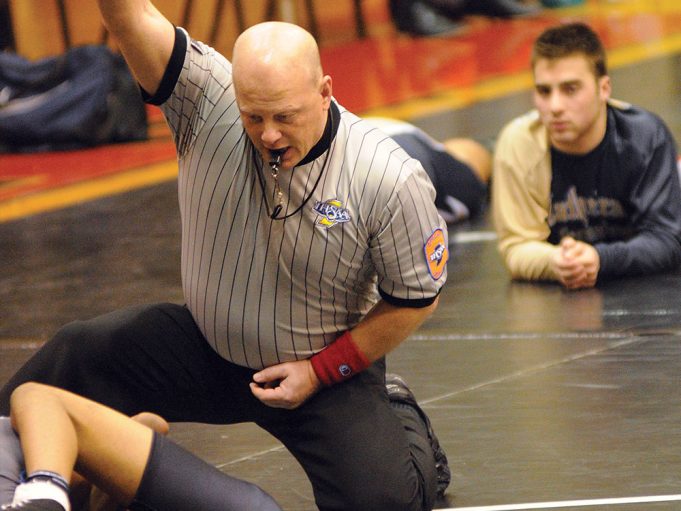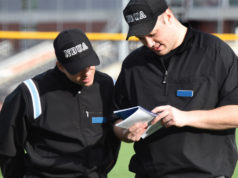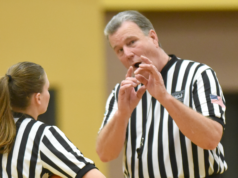Luck has been defined as what happens when preparedness meets opportunity, and opportunity is there all the time. Question: When opportunity comes, will you be prepared?
Educator and author J.B. Matthews wrote, “Unless a man has trained himself for his chance, the chance will only make him look ridiculous.” How much time are you spending on your own self-improvement as an official? When it comes time for the last play of the big game, will you be ready for that defining moment?
Set a single goal and work on it until it is 100 percent complete
Here’s a simple formula for making your own luck: Set a single goal, go to work on it until it is 100 percent complete. Repeat. Here are some ways to do just that.
Try the 30-minutes-a-day routine. Take out a blank sheet of paper and write your present, primary goal at the top of the page. Then, spend some time jotting down ideas you can use for improving your lot in officiating. For example, if your goal is to work the finals of your sport for your particular league or level, write down some ideas on how you can make that happen.
That is an extremely effective way to jump-start your career, especially if it has gotten stagnant or banal. Do that for 30 minutes a day (or an hour if you can), five days a week. If you do that for one year, you will have spent 130 hours thinking of ways to improve your officiating and your life.
Your goal has yet to be fulfilled. Your job is to bridge the gap between where you now are and the point you wish to reach. By spending time thinking, you’re exercising your mind. Like physical exercise to build muscles, your mind begins to develop and expand by mental exertion. Take full advantage of that power, because your mind is waiting for you to discover those hidden gems lurking all about you.
The weakest key skill method.
No matter what you do, there’s always something to work on and improve. What is that one thing for you? In your officiating, what is the one key skill you could develop that can help you become a more effective official?
It could be the simplest, most mundane thing: holding your shoulders back, looking up, communicating more. It may be more concentration and focus, physical conditioning or better health or eating habits. Take an objective look at where you now stand as an official. Identify your weakest skills, and pick your weakest key skill. Then set a goal to become better at that one skill until you’ve mastered it.
Now, that sounds elementary, but it is actually one of the most effective ways of improving your officiating. By eliminating one of your weakest skills, you move closer and closer to improving on all your other skills. Sure enough, once you begin working on your communication skills, your awareness improves, your concentration increases and your confidence soars. Every improvement works on all of your other gifts as well.
Once you’ve mastered that one skill and feel like you’ve got the hang of it, ask yourself, “Now, what one skill would help me the most in my officiating?” And once again, set it as a goal and set out to work on it. If you follow the process of improving on your weakest key skill, you will be absolutely amazed at what happens. Partners begin to compliment you on your calls. Your supervisors will be impressed by the job you’re doing on the field or court. By becoming better at just one thing at a time, you will begin making your own luck.
The pregame and postgame review technique.
Before you hop into a contest, ask yourself what one thing you can go to work on that day. Once you come up with that answer, make it a point to focus single-mindedly on that skill all game long.
Once the game is over, ask yourself, “What did I do well today? What would I have done differently if I had to do that game all over again?” Your answers to the first question become your strengths, and answers to the second question become items to work on. You could always ask those questions to your supervisor, evaluator or even your partners if you have trouble coming up with some answers. Pick one weakness to work on next game. Your strengths are simply things you have already mastered. You may even be surprised to find that you did something well that you weren’t particularly good at before. Great job.
Finally, if you accomplish something you’ve worked really hard for, celebrate. The very best way to get even hungrier for your next big assignment or task is to reward yourself for the discipline you put forth in achieving your goals. Remember that the harder you work on what you want, the harder it will work on you. Start creating your own luck today.
What's Your Call? Leave a Comment:
Note: This article is archival in nature. Rules, interpretations, mechanics, philosophies and other information may or may not be correct for the current year.
This article is the copyright of ©Referee Enterprises, Inc., and may not be republished in whole or in part online, in print or in any capacity without expressed written permission from Referee. The article is made available for educational use by individuals.


















